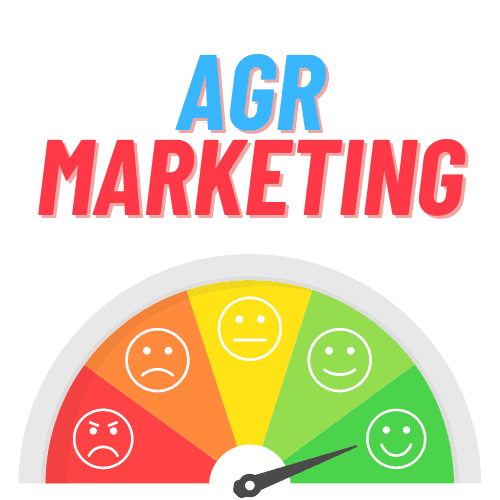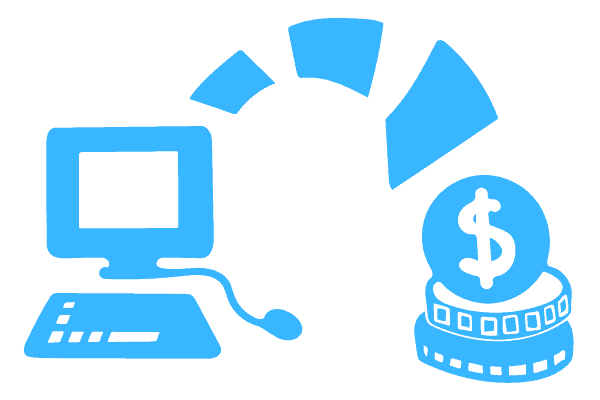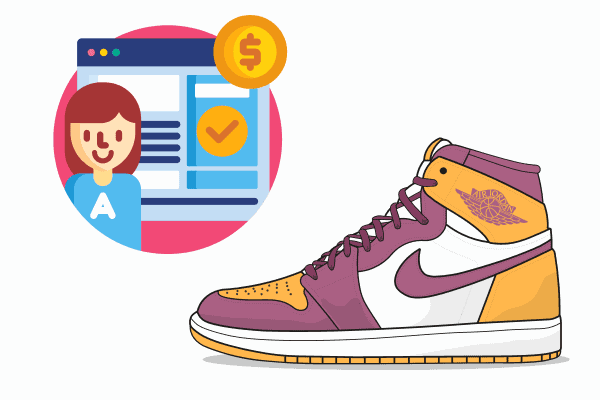49 Best Affiliate Programs for Beginners Without a Website
No Website? No Problem! Top Affiliate Programs for Beginners in 2023
Have you ever wondered how some folks make a killing online without selling a single product? Well, welcome to the world of affiliate marketing! It’s an essential cog in the digital economy wheel, where affiliates play a pivotal role in marketing campaigns.
Affiliate marketing is about promoting other people’s products and earning a commission for each sale or lead you generate. The mechanics are simple – you pick a product, promote it, and make a piece of the profit from each sale that comes via your referral link.

There are different types of affiliate marketing models out there. Some popular ones include Pay Per Sale (PPS), Pay Per Click (PPC), and Pay Per Lead (PPL). Each has its unique benefits and drawbacks.
But why should marketers care? Affiliate marketing can be an incredibly cost-effective way to drive traffic and sales. Plus, it offers potential benefits like increased brand awareness and customer acquisition at scale.
This guide delves into the best affiliate programs for beginners without a website. So buckle up because we’re about to embark on an exciting journey into the lucrative affiliate marketing world!
49 Best Affiliate Programs for Beginners Without a Website
- Amazon Associates: One of the largest affiliate programs suitable for all niches.
- ClickBank: A marketplace that provides a variety of digital products.
- ShareASale: Offers a vast network of advertisers across various niches.
- CJ Affiliate (formerly Commission Junction): Another vast affiliate network.
- Rakuten Advertising: Though smaller than others, it has some exclusive brands.
- Impact Radius: Modern platform with top-tier brands and unique features.
- Bluehost: Ideal for those promoting website hosting.
- HostGator: Another popular hosting company with a lucrative affiliate program.
- SiteGround: A web hosting company with great payouts.
- Wix: Website builder with a program for affiliates.
- Skillshare: Earn by promoting online classes.
- Udemy: Promote courses from various categories.
- Fiverr: Refer both clients and freelancers and earn money.
- Tailwind: A tool for scheduling Pinterest and Instagram posts.
- Shopify: Earn by promoting this e-commerce platform.
- Elegant Themes: Known for their popular WordPress themes.
- ThemeForest: Part of Envato Market; promotes themes and templates.
- Grammarly: The popular grammar checking tool offers an affiliate program.
- ConvertKit: Email marketing software suitable for bloggers.
- GetResponse: Another email marketing platform.
- SEMrush: A tool for SEO and SEM, offers a recurring commission.
- TubeBuddy: A tool for YouTube channel management.
- Canva: Design tool with an affiliate program.
- Leadpages: Promote this landing page builder and earn a commission.
- Teachable: Earn by promoting this online course platform.
- Kajabi: Another platform for online courses and coaching.
- NordVPN: Popular VPN service with a lucrative affiliate program.
- ExpressVPN: Another VPN service with good commissions.
- ClickFunnels: Earn by promoting this sales funnel builder.
- MailerLite: Email marketing platform suitable for beginners.
- Moosend: Another user-friendly email marketing tool.
- Thrive Themes: Known for WordPress themes and plugins.
- AWeber: Long-standing email marketing tool with an affiliate program.
- SendinBlue: Email and SMS marketing platform.
- TravelPayouts: For those interested in the travel niche.
- Booking.com: Hotel booking platform with an affiliate program.
- Survey Junkie: Earn by promoting surveys.
- Swagbucks: A popular cashback and rewards site.
- DigiStore24: A rapidly growing online marketplace.
- CreativeLive: Promote courses, especially for creatives.
- BigCommerce: E-commerce platform with a lucrative program.
- Weebly: Web hosting and website builder platform.
- Sellfy: E-commerce tool primarily for digital product sellers.
- Printful: Dropshipping company for custom merchandise.
- Redbubble: Platform for independent artists to sell their designs.
- Squarespace: Known for its website builder and hosting services.
- TripAdvisor: Earn by promoting hotel bookings and reviews.
- HubSpot: They offer a vast suite of tools, and their affiliate program is growing.
- Etsy: Although not a direct affiliate program, you can earn through Etsy’s Partner Program.
Understanding Affiliate Programs
So, what’s the big deal about affiliate programs? Picture this. You’re a fan of a product or service, and you share your love for it with others. In return for spreading the word, you get a slice of the profit pie each time someone purchases through your unique referral link. That’s an affiliate program in a nutshell.

The Workings of Affiliate Programs
Affiliate programs are like middlemen between merchants (those who sell products/services) and affiliates (people like you and me who promote those products/services). Merchants provide affiliates with unique links to their products or services when someone clicks on that link and makes a purchase; bingo! The affiliate earns a commission.
The process usually goes something like this:
- You join an affiliate program.
- You choose products or services to promote.
- You share your unique referral links online.
- Someone clicks on your link and buys the product/service.
- You earn a commission from that sale.
Critical Components of Affiliate Programs
Every affiliate program has some key components:
- Merchant: This is the party that creates the product or service.
- Affiliate: That’s you! Affiliates promote the merchant’s product/service using their unique referral link.
- Consumer: These people click on your referral links and make purchases.
- Network: This is where merchants list their products/services for affiliates to find and promote.
Role of Merchants and Affiliates
Now let’s dive into roles:
- Merchants have one main job: create awesome stuff people want to buy! They also handle all sales transactions, customer service issues, returns – everything after the point of sale.
- As an affiliate, your role is pretty straightforward: get people excited about these products/services so they’ll want to buy them through your referral link!
Common Payout Structures
Most often, there are three ways affiliates can be paid:
- Pay per Sale: You earn money when someone purchases via your referral link.
- Pay per Click: You earn money when someone clicks on your referral link—no purchase necessary!
- Pay per Lead: You earn money when someone provides their contact information at the merchant site through your referral link.
Selecting Suitable Programs
Choosing which affiliate programs to join can feel overwhelming, but here are some tips:
- Look for high-quality products/services that you believe in
- Research if there’s market demand for these products/services
- Check out how much commission they offer
- Read reviews about their customer service
Remember, it’s not always about choosing programs with high payouts but selecting ones with great potential for success!
Affiliate marketing is all about promoting things you love while making cash along the way! It might sound not easy at first glance, but once you understand its essential components—it’s as easy as pie!
Why Choose Website-less Affiliates?
The Upsides
Affiliate marketing without a website? That sounds like a tall tale, right? But it’s as natural as rain. And the advantages are nothing to sneeze at.
First off, you’re cutting out the middleman – the website. That means no more worrying about hosting fees, domain names, or site design. It’s like going from farm to fork in the affiliate marketing world.
Secondly, you’re not tied down to one location. You can be as mobile and flexible as a yoga instructor on vacation. You can work from anywhere – your local coffee shop, your grandma’s basement, or even an igloo in Alaska if that is your fancy.
And let’s not forget about speed. Without a website to set up, you can hit the ground running faster than Usain Bolt on roller skates.
Success Stories
Think this is all hot air? Well, grab onto your hat because these success stories will blow you away:
John Stevens – Can you believe this? This guy started his journey just like you and me, without any idea about affiliate marketing. He didn’t even have a website! Now, you might wonder, “How did he manage to do that?” Well, let me tell you. This fellow decided to take the plunge into the world of affiliate marketing about two years ago.
At that time, he was as clueless as a kid in a top hat – no knowledge of affiliate marketing, no website, nothing. But guess what? He didn’t let that stop him! He picked a niche that he was passionate about – fitness.
You know, all those excellent workout routines, diet plans, gym equipment, etc. And then, he started promoting fitness products on social media platforms.
We’re talking Instagram, Facebook, Twitter – you name it! Now here comes the exciting part. Fast forward two years from when he started, and guess what? He’s now making six figures annually! Yes, you heard that right.
This guy is raking in over $100,000 each year just by selling fitness products on social media platforms. So what’s the secret sauce here?
It’s simple. He found something he loved (fitness), used the power of social media (which is accessible), and turned his passion into a profit-making machine. And the best part? He did all of this without even having a website. So if you’re sitting there thinking you need a fancy website to start making money with affiliate marketing, think again! This guy is living proof that you can make it big in the affiliate marketing world with passion and the right strategy.
Jane Olgar – Let me tell you a story about an intelligent lady who found a clever way to make money online. She didn’t have a website, but guess what? She didn’t need one! Instead, she used her popular YouTube channel, a platform that’s free for anyone to use.
Now, you might be wondering what she did on this channel. Well, she decided to promote beauty products. She’d discuss different products in her videos, everything from lipsticks to eyeshadows and even skincare items.
She’d show how to use them, give her honest reviews, and then share a link where her viewers could buy these products if they liked them.
This is called affiliate marketing. It’s like being a middleman (or middlewoman in this case!) between the product seller and the buyer. The best part? She earned money whenever someone clicked on her link and bought the product!
It might not seem like much initially, but imagine thousands of people watching her videos and buying her recommended products.
The pennies quickly turned into dollars; she was making serious cash before she knew it! So now, instead of worrying about bills or saving up for that vacation she always wanted, she’s laughing all the way to the bank.
And all of this without needing any website! Isn’t that amazing? So if you’re thinking about starting affiliate marketing, remember this story. You don’t need a fancy website to start making money online. You only need a platform to connect with people and the right products to promote!
Initially skeptical, but affiliate marketing without a website has genuinely changed my game. At first, it seemed impossible – how could I promote products without a dedicated platform? But boy, was I wrong!
What I love about this method is its simplicity—no need to spend countless hours designing and maintaining a website. I can focus on what truly matters: promoting products I believe in and connecting with my audience.
I can instantly reach thousands of potential customers using social media platforms like Facebook, Instagram, and Twitter. And the best part? It’s free! I can create engaging content, build relationships with my followers, and promote products seamlessly.
I’ve also started using email marketing. It’s a powerful tool that lets me keep my audience updated about new products and offers. I can personalize my emails, which helps build trust and loyalty with my audience.
And let’s not forget about YouTube. Creating video content is a fantastic way to showcase products and their benefits. It’s a more personal approach that allows me to connect with my audience more deeply.
The results have been nothing short of amazing. I’ve seen a significant increase in my earnings, and the feedback from my audience has been overwhelmingly positive. They appreciate the honesty and authenticity of my promotions.
But what I appreciate the most is the freedom. I can work from anywhere, anytime—no need to be tied to a desk or a specific location.
So, if you’re considering affiliate marketing, don’t let the lack of a website hold you back. There’s a world of opportunities; all you need is determination and creativity. Trust me; you won’t regret it.
Platform Options
So where do these affiliates ply their trade if not on websites? Here are some examples:
- Social media platforms (Facebook, Instagram)
- Video-sharing sites (YouTube)
- Email newsletters
- Podcasts
- Online forums (Reddit)
Each platform offers unique ways for affiliates to connect with potential customers and drive sales.
Cost Comparison
Let’s talk business for a minute here: traditional affiliate marketing methods involving websites can cost an arm and a leg, what with web design services or learning materials, plus ongoing costs like hosting fees and domain renewals.
But when you go the website-less route? You’re looking at no setup costs – nada!
Flexibility & Mobility
The freedom offered by this approach is sweeter than apple pie on a summer day:
- Work from anywhere
- Change up strategies quickly
- Tap into different markets easily
- No need to worry about site maintenance or updates
This makes it perfect for folks who value flexibility over stability – like choosing a freelance gig over a 9-to-5 job!
Setup Speed
Finally, there’s the setup speed: traditional methods require time-consuming tasks such as purchasing a domain name, setting up a hosting account, designing a website layout, etc., whereas going the sans-website route lets you dive right into action quicker than greased lightning!
Overview of Suitable Programs for Novices
User-Friendly Features
Diving headfirst into affiliate marketing can be like trying to swim in an ocean with no land in sight. But fear not; there are programs designed with beginners in mind. These programs prioritize user-friendly interfaces that make navigating the choppy waters of affiliate marketing a breeze.
They also provide robust support systems to throw you a lifebuoy when needed.
For instance, Amazon Associates is renowned for its intuitive interface and comprehensive support system. It simplifies finding and promoting products, making it an excellent choice for beginners without websites.
- Amazon Associates: Known for its easy-to-use interface and extensive product range.
Another contender is CJ Affiliate, which offers real-time reporting tools and various advertisers.
- CJ Affiliate: Offers real-time reporting tools and diverse advertiser options.
Commission Rates & Payment Terms
Affiliate marketing isn’t just about ease of use; it’s about earning potential too! Therefore, considering commission rates and payment terms is crucial. Some programs offer high commission rates but strict payment terms, while others offer lower commissions but more flexible payment options.
For example:
- ShareASale: High commission rates but requires a $50 minimum balance for payout.
- ClickBank: Lower commission rates but offers weekly payments with no minimum balance required.
Remember, don’t get blinded by high percentages alone; consider how often you’ll receive your earnings too!
Relevance & Dependability
Promoting products or services that align with your interests or expertise will make your journey smoother. So look out for programs that are relevant to what you’re passionate about!
Let’s say you’re into fitness; then a program like BodyBuilding.com’s Affiliate Program could be right up your alley:
- BodyBuilding.com’s Affiliate Program: Perfect match if you’re into the health and fitness niche.
Lastly, always check reviews and testimonials before diving in – dependability matters! For instance, Rakuten Marketing has great reviews highlighting their reliable tracking system:
- Rakuten Marketing: Known for its accurate tracking system per multiple user reviews.
Enrollment Guide for Affiliate Programs
Joining an Affiliate Program: A Walkthrough
Joining affiliate programs, especially the best ones for beginners without a website, can feel like trying to solve a Rubik’s cube blindfolded. But fear not! It’s simpler than you think. First, find an affiliate program that suits your niche and interests. Once you’ve got that covered, it’s time to apply.
- Locate the ‘Affiliate’ or ‘Partnership’ link on their site.
- Fill in the application form with accurate details.
- Submit and wait for approval.
Piece of cake, right? But remember, honesty is essential here – don’t try to fake any information.
The Nitty-Gritty: Application Requirements
Like applying for a job or a school program, specific documents or requirements are needed during the application process. These usually include:
- Valid identification (ID), such as a passport or driver’s license
- Bank account details
- Tax Information
Make sure to gather these beforehand so your application process goes smoothly!
Deciphering The Fine Print
Understanding terms and conditions before signing up is crucial – it’s like knowing the rules of the road before getting behind the wheel. They outline what’s expected of you and what you can expect from them. So buckle up and read those T&Cs carefully!
Creating Compelling Profiles
Creating compelling profiles or pitches is like preparing for a first date – presentation matters! Here are some tips:
- Be clear about who you are and what you do.
- Highlight your skills and experiences relevant to promoting products.
- Showcase past achievements, if any.
Remember, this isn’t about being someone else; it’s about putting your best foot forward!
Tracking Codes & Referral Links: Your New Best Friends
Tracking codes or referral links aren’t just random characters; they’re your ticket to earning commissions! They’re unique identifiers that track when someone clicks through your promotion to make a purchase.
Navigating through initial setup processes might seem daunting at first – but think of it as setting up a new gadget; once done right initially, it’ll work seamlessly afterward!
So there you have it – a step-by-step guide on enrolling in affiliate programs even without having your website! Now take those first steps toward becoming an affiliate marketer superstar!
Strategies for Affiliate Marketing Success
No Website, No Problem
Just because you don’t have a website doesn’t mean you can’t make it big in affiliate marketing. Plenty of promotional techniques work just as well, if not better.
- Social media platforms like Facebook and Instagram are perfect for product promotion. You can create engaging posts or even short videos to showcase the products.
- Email lists are another great tool. You can send out regular newsletters with product information and special offers.
- Participating in online forums and communities related to your niche can also help build visibility.
Remember, it’s all about getting people to click on your affiliate links. So be creative and think outside the box.
Trust is Key
Building trust with potential customers is crucial in any business, especially affiliate marketing. Without faith, people won’t click on your links or buy the products you’re promoting.
Here’s how to do it:
- Be honest about your affiliations. People appreciate transparency.
- Only promote products that you genuinely believe in and would use yourself.
- Provide valuable content that helps people solve problems or fulfill needs.
By doing these things, you’ll establish yourself as a reliable source of information, making people more likely to follow your recommendations.
Leverage Social Media
Social media isn’t just for selfies anymore; it’s also a powerful tool for marketers! Here’s how you can leverage social media channels effectively:
- Share high-quality photos of the products along with engaging captions.
- Use relevant hashtags to increase visibility.
- Engage with followers by responding to comments and messages promptly.
Social media marketing can drive significant traffic to your affiliate links.
Email Lists & Online Communities
Email lists and online communities offer excellent opportunities for promotion without a website:
- An email list gives you direct access to potential customers’ inboxes to share personalized offers and product updates.
- Online communities (like Reddit or Quora) allow open discussions where you can subtly introduce your affiliate products when answering questions or providing solutions.
Remember not to spam, though – always provide value first!
Monitor Performance Metrics
Keeping an eye on performance metrics is essential for success:
- Click-through rates: How many people clicked on your affiliate link?
- Conversion rates: How many clicks resulted in sales?
- Average order value: How much does each sale bring in?
These numbers give insights into what’s working and what’s not so you can tweak strategies accordingly.
Adapt Based on Feedback & Results
Finally, never stop learning! Always be ready to adapt based on feedback from customers or results from analytics tools:
If something isn’t working? Change it up! If something works well? Do more of it!
In this ever-evolving field of digital marketing, flexibility is key!
Potential Earnings in Affiliate Marketing
So, you’re probably wondering, “How much can I make with affiliate marketing?” Well, let’s get straight to the point. The earning potential is enormous, but it varies greatly. Some affiliates earn a few hundred dollars monthly, while others rake in thousands or millions annually.

Realistic Income Expectations
Let’s talk numbers. It’s common for beginners to earn anywhere from $50 to $100 monthly in the early stages. As you gain experience and build your audience, you could earn $1,000 to $2,000 monthly after a year or two.
Don’t be fooled by those who flaunt massive earnings online. Remember that these are outliers and not the norm. What matters most is consistency and growth over time.
Factors Influencing Earning Potential
Several factors can influence your earnings:
- Niche: Some niches are more profitable than others.
- Traffic: More traffic usually equals more sales.
- Conversion rate: This depends on your promotional strategies and the quality of the products you promote.
- Commission rate: Different programs offer different rates.
Carefully consider these factors when choosing an affiliate program.
Case Studies Showcasing Successful Earnings
Consider Pat Flynn of Smart Passive Income, who earned over $2 million through affiliate marketing alone in 2017. Or take Michelle Schroeder-Gardner of Making Sense of Cents, who consistently makes over $50,000 monthly from affiliate marketing.
These case studies show that substantial earnings are possible with hard work and intelligent strategies.
Impact of Market Trends on Earnings
Market trends can significantly impact earnings. For example, people spend more money online during holidays like Black Friday or Christmas, increasing affiliate sales.
However, market downturns or changes in consumer behavior can also negatively affect earnings, so it’s crucial to stay updated with current trends and adapt accordingly.
Comparison with Other Online Income Streams
Compared to other online income streams, such as freelancing or dropshipping, affiliate marketing has several advantages:
- Low startup cost: You don’t need much money to start.
- Passive income: Once set up correctly, it can generate income even when you’re not working.
- Flexible schedule: You have control over your time.
- Location independence: You can work from anywhere with an internet connection.
However, it requires patience and consistent effort before seeing significant results compared to other methods, where returns may be quicker but less passive.
Ways To Maximize Earnings
To maximize your affiliate marketing earnings:

- Promote high-quality products relevant to your audience.
- Use SEO techniques to drive organic traffic.
- Leverage email marketing for repeat sales.
- Test different promotional strategies to see what works best for you.
Challenges and Risks in Affiliate Marketing
Obstacles for Newbies
New affiliates face a steep learning curve. They need to learn about the best affiliate programs for beginners without a website, how to promote products effectively, and how to navigate the complex world of search engine optimization (SEO).
- SEO knowledge: SEO is like solving a jigsaw puzzle with constantly moving pieces. Google’s algorithms are always changing, making it difficult for new affiliates to keep up.
- Product promotion: Promoting products can be tricky. It’s not enough to post links on social media; successful affiliates must create engaging content that convinces people to click on their links and make purchases.
The competition in popular niches is fierce. Imagine being a small fish in a big pond full of hungry sharks – that’s what it feels like when starting as an affiliate marketer in a crowded niche.
Risky Business
Affiliate marketing isn’t all sunshine and rainbows; risks are also involved.
- Payment delays/frauds: Some affiliate programs are notorious for delaying or not paying. It’s like working hard at your job only to find out your paycheck has been ‘lost’ in the mail.
- Slow initial growth: The early stages of an affiliate marketing business can be slow going. It’s like planting seeds and waiting patiently for them to sprout – it takes time and patience.
Overcoming Challenges
Despite these challenges, there are ways new affiliates can mitigate risks and overcome obstacles.
- Choose reliable affiliate programs: Do your homework before signing up with any program. Look for ones with good reputations and positive reviews from other affiliates.
- Create high-quality content: Content is king in the world of affiliate marketing. High-quality content attracts more visitors, which increases the chances of conversions.
- Stay motivated: Success doesn’t happen overnight in this business, so it’s important not to get discouraged if things don’t take off immediately.
Remember, every expert was once a beginner who kept going despite their challenges!
Competition: Friend or Foe?
Competition is tough in popular niches, but don’t let that scare you away! Think of competitors as teachers rather than enemies – they can show you what works and what doesn’t in your chosen niche.
Here’s an example:
| Competitor | What They Do Well | What You Can Learn |
|---|---|---|
| Competitor A | Excellent blog content | How to write engaging posts |
| Competitor B | Effective use of social media | Social media strategies |
Learning from others’ successes (and failures) can help you carve out your path toward success!
Don’t Let Slow Growth Get You Down
It can be disheartening when growth is slow initially but remember – Rome wasn’t built in a day! Stay motivated by setting small achievable goals along the way.
For instance:
- Write one high-quality blog post per week
- Increase website traffic by 10% each month
- Gain 100 new email subscribers within three months
Achieving these mini-goals will keep your spirits up while you work towards more significant milestones!
Current Trends in Affiliate Marketing Landscape
The New Wave of Development
Affiliate marketing has always been dynamic, but the latest developments are revolutionary. For instance, AI and machine learning technologies have made it possible for marketers to predict consumer behavior with unprecedented accuracy. This makes it easier to target the right audience at the right time.
Moreover, blockchain technology is also making its mark in affiliate marketing. It offers transparency, allowing marketers to track their campaigns precisely. This way, they can quickly identify what works and what doesn’t, helping them optimize their strategies for better results.
Tech Advancements: A Game Changer
Technology advancements haven’t just influenced affiliate marketing; they’ve transformed it entirely. With programmatic advertising, marketers can automate the buying and selling process of ad inventory through an automated bidding system. This saves time and ensures that ads reach the most relevant audience.
Furthermore, big data analytics has given affiliate marketers access to customer preferences and behaviors. Analyzing this data allows them to create personalized ads that resonate with their target audience.
Consumer Behavior: The Steering Wheel
Consumer behavior plays a significant role in shaping affiliate marketing strategies. Today’s consumers are more informed than ever—they research thoroughly before purchasing. As such, content-rich affiliate websites that provide valuable information are gaining popularity.
What’s more? Consumers these days prefer shopping on mobile devices rather than desktops or laptops. Therefore, mobile-friendly affiliate sites are no longer an option—they’re a necessity.
Emergence of New Platforms/Channels
New platforms and channels have opened up new avenues for affiliate marketing. Social media platforms like Instagram and Pinterest have become popular among affiliate marketers due to their vast user base and high engagement rates.
Video-sharing platforms like YouTube offer unique opportunities for affiliates who want to leverage video content for promotion.
Even podcasting is proving to be an effective channel for affiliate marketing—with listenership on the rise, many affiliates are partnering with podcasters to promote their products/services.
COVID-19 Impact: A Double-edged Sword
The COVID-19 pandemic has positively and negatively impacted the affiliate marketing industry. On one hand, lockdowns led to a surge in online shopping—giving affiliates more opportunities to earn commissions.
On the other hand, many businesses tightened their budgets due to economic uncertainties, resulting in reduced commission rates or even discontinuation of some programs.
Nevertheless, despite these challenges, the industry survived and thrived amidst this global crisis.
Future Predictions: What Lies Ahead?
Looking ahead over the next few years:
- Influencer marketing will continue growing as influencers prove invaluable in building trust between brands and consumers.
- Voice search optimization will become crucial as more people use voice assistants like Alexa and Siri.
- Native advertising will gain prominence because it provides users with a seamless browsing experience by blending ads into website content.
- Sustainability will become important as consumers increasingly prefer brands that care about social issues, and affiliates tend to align themselves accordingly.
Boosting Earnings: Proven Tips
Consistent & Persistent Efforts
Like a marathon runner, consistency and persistence are the keys to unlocking your earning potential in affiliate marketing. It’s not about sprinting to the finish line pacing yourself.
- Take baby steps. Start by promoting a single product before expanding your portfolio.
- Stick to a schedule. Allocate specific hours each day for your affiliate marketing activities.
- Keep going even when the going gets tough. Remember, Rome wasn’t wasn’t a day!
Persistence is equally essential. You might not see immediate results but don’t discourage you.
- Be patient. It takes time for your efforts to bear fruit.
- Stay motivated. Celebrate small victories along the way.
- Don’t I don’t quickly? Remember, success is often just around the corner!
Building Strong Relationships
In affiliate marketing, relationships matter—a lot! Strong relationships can significantly boost your earnings, whether it’s merchants or customers.
- With merchants: Establishing a good rapport with merchants can lead to better deals and higher commissions.
- Communicate regularly: Keep them updated about your promotional activities and achievements.
- Provide feedback: Share insights on what’s and what’s customers: Building customer trust can increase conversion rates and repeat purchases.
- Engage actively: Respond promptly to queries and comments.
- Add value: Provide helpful content that goes beyond mere product promotion.
Diversifying Your Portfolio
Don’t put your eggs in one basket! Diversifying across multiple products/programs is a smart way of mitigating risks and maximizing returns.
- Promote different types of products – physical goods, digital products, services, etc.
- Join various affiliate programs – Amazon Associates, ClickBank, CJ Affiliate, etc.
- Experiment with different niches – tech gadgets, health supplements, online courses, etc.
Remember, though, diversification doesn’t doesn’t-reading yourself too thin! It’s aboIt’sinding the right balance between quantity and quality.
Staying Updated About the Latest Trends
The world of affiliate marketing is dynamic—it evolves constantly! To stay ahead of the game:
- Follow industry blogs/newsletters
- Attend webinars/seminars
- Participate in forums/discussions
By staying updated about the latest trends:
- You’ll adapt swiftly to market changes
- You’ll hYou’llesh ideas for content creation
- You’ll kYou’lltracting new visitors while retaining existing ones
Leveraging Analytics
Data doesn’t it wisely! The power of leveraging analytics cannot be overstated when it comes to improving strategy in affiliate marketing.
For instance:
| Metrics | Why It Matters |
|---|---|
| Traffic Source | It helps identify which channels are driving most visitors |
| Bounce Rate | Indicates if visitors find your content engaging |
| Conversion Rate | Shows how many visitors are turning into buyers |
By analyzing these metrics (and more), you’ll gain valuable insights into what’s well and what needs improvement—helping you make data-driven decisions that boost earnings!
So there you have the proven tips for boosting earnings as an affiliate marketer without a website! Now go forth and conquer!
Future Predictions for Affiliate Marketing
The Growth Trajectory
The affiliate marketing industry is expected to skyrocket in the coming years. According to a study by Statista, affiliate marketing spending in the U.S. alone is projected to hit $8.2 billion by 2022, up from $5.4 billion in 2017. That’s aThat’sing 52% increase!
Let’s break this down:
- Emerging markets like India and China are seeing rapid internet penetration.
- More people are getting comfortable with online shopping.
- A growing number of businesses are turning towards affiliate marketing.
All these factors contribute to the industry’s growth trajectory.
Tech Advances and Their Impact
With technological advances, we will likely see significant changes in affiliate marketing.
For instance:
- Machine Learning can help predict consumer behavior more accurately.
- AI-powered chatbots can engage customers better and even upsell products.
- Blockchain can bring transparency into transactions and reduce fraud.
These technologies will make processes efficient and enhance customer experience, increasing affiliate conversions.
AI, Machine Learning, Blockchain – The Game Changers
AI and machine learning have already started changing the dynamics of many industries; affiliate marketing is no exception! They can analyze vast amounts of data swiftly, helping affiliates understand their audience better and tailor their strategies accordingly.
Similarly, blockchain technology could be a game-changer too! Imagine having a transparent system where every click you generate gets recorded on a public ledger that cannot be manipulated or deleted. It would revolutionize how commissions are tracked and paid!
Opportunities in Emerging Markets
Emerging markets present lucrative opportunities for affiliates due to several reasons:
- The rapidly growing internet user base
- Increasing adoption of e-commerce
- High smartphone penetration rates
Affiliates who tap into these markets early will have an edge over others when these markets mature.
Consumer Preferences – The Shift
Consumer preferences are continuously evolving—today’s Today’srs value personalized experiences over generic ones. Therefore, affiliates who leverage data-driven insights to offer customized recommendations will succeed in attracting more customers.
Moreover, consumers prefer brands that stand for something beyond profits—like sustainability or social causes—affiliates promoting such brands will likely witness higher conversion rates.
Regulatory Changes – What Lies Ahead?
Regulatory bodies worldwide are becoming more vigilant about digital practices affecting consumer rights. For instance: GDPR in Europe has stringent rules about data privacy, which directly impact how affiliates collect and use consumer data.
Such regulatory changes mean affiliates must be proactive about compliance lest they face hefty penalties or damage to their reputation among consumers.
Concluding Thoughts on Affiliate Programs
Affiliate marketing is a goldmine when done right. We’ve waWe’vethrough the ins and outs of affiliate programs, especially those without a website. It’s client’s day, so these are the go-to for newbies. They’re accessible and provide an excellent starting point.
We dived into some top-notch programs perfect for beginners. Then we tackled how to get your foot in the door with enrollment guides. Remember, strategy is critical to success in this game. You have to know what you’re you make it big.
Potential earnings? Sky’s the limit! But don’t forget about challenges and risks too. It isn’t all smooth sailing in affiliate marketing land.
Stay ahead of the curve by keeping tabs on current trends and boosting earnings. We got you covered with proven tips that’ll help those dollars.
What’s affiliate marketing? Only time will tell, but one thing isn’t going anywhere soon.
Time to take action now! Get out there and start making your mark in affiliate marketing!
FAQs – Best Affiliate Programs for Beginners Without a Website
What are some excellent website-less affiliates for beginners?
Several good options, like Amazon Associates, ClickBank, CJ Affiliate, etc., offer a wide range of products for promotion without needing a website.
How much can I potentially earn from these programs?
Earnings can vary greatly depending on your chosen niche, the effort to promote products, etc. Still, you can earn a decent income with dedication and intelligent strategies.
Are there any risks involved in affiliate marketing?
Like any business venture, risks include not making sales or dealing with unreliable affiliate companies. However, proper research and careful planning can help mitigate these risks.
Can I boost my earnings from affiliate marketing?
Absolutely! You can significantly increase your earnings by employing effective strategies like targeting high-commission products or optimizing your promotional methods.
Is there future potential in affiliate marketing?
Definitely! With e-commerce increasing each year and more businesses recognizing the value of affiliates, the future potential looks promising.
We’re reader-supported. We may earn an affiliate commission when you buy through links on our site.

Angus Robertson is an authority in online marketing, affiliate marketing, and Search Engine Optimization (SEO). With an innate passion for the digital world, he has spent the last two decades assisting businesses in amplifying their online presence and boosting profitability.






